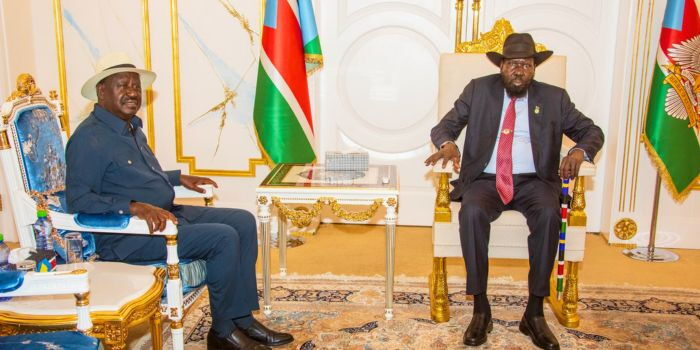South Sudan Responds to Raila Odinga’s Claims in Strong Statement
Raila Odinga has faced a diplomatic setback in South Sudan after alleging that he was denied a meeting with First Vice President Riek Machar and was instead advised to seek permission from Ugandan President Yoweri Museveni.
However, the government of South Sudan has now dismissed these claims, adding a new twist to the controversy.
David Amuor Majur, the Press Secretary to South Sudan’s President Salva Kiir, refuted Odinga’s assertions, emphasizing that President Kiir never instructed the Kenyan opposition leader to consult President Museveni. According to Majur, Odinga’s remarks misrepresented diplomatic procedures, as Kiir never gave such directives.
Furthermore, the South Sudanese government clarified that Odinga’s visit to Uganda to meet Museveni was planned in advance and was not initiated by Kiir.
“The claim that President Salva Kiir Mayardit requested Raila Odinga to meet President Museveni is not accurate and misrepresents diplomatic norms,” Majur stated.
He further stressed that Odinga’s trip to Uganda had already been scheduled, and no one had sent him there on behalf of President Kiir.
“The Right Honorable Odinga’s mission to Uganda was arranged beforehand. Nobody instructed him to go and speak with President Museveni,” Majur reiterated.
Why Raila Was Denied Access to Riek Machar
Despite denying Odinga’s claims about Uganda, the South Sudanese government admitted that he was indeed denied a meeting with Machar.
Majur explained that President Kiir had assured Odinga that he could meet Machar only after briefing all IGAD (Intergovernmental Authority on Development) heads of state.
“Raila requested to meet Machar, but President Kiir explained that the First Vice President is under investigation.
However, he promised that in the future, after consulting with the IGAD member states, Odinga might have an opportunity to meet and speak with Machar,” Majur explained.
Odinga’s role as IGAD’s special envoy to South Sudan was to help mediate between Kiir and Machar in order to preserve the fragile peace agreement and prevent further instability.
His mission was to calm tensions following Machar’s detention, which has sparked concerns about the future of the peace deal in Juba.
IGAD’s Role and the Risk to South Sudan’s Peace
The IGAD heads of state, recognizing the delicate situation, assigned Odinga the task of mediating peace talks between Kiir and Machar to prevent the country from descending into another crisis.
Upon arriving in Juba on Friday, Odinga met with President Kiir but later told the Kenyan media on Saturday that he was blocked from seeing Machar and was instead directed to speak with Museveni in Uganda.
“I requested to meet with Dr. Machar, but they refused to grant me access. Instead, they advised me to go and speak with President Museveni, which I did. After my meeting with President Kiir, I traveled to Entebbe,” Odinga stated.
The South Sudan Revitalized Transitional Government of National Unity (R-TGoNU), which appointed Machar as First Vice President, is based on the fragile 2018 peace agreement that ended a brutal five-year civil war.
Any attempts to sideline Machar could put the peace deal at risk and challenge the government’s legitimacy.
South Sudan, which gained independence from Sudan on July 9, 2011, plunged into conflict in 2013, just two years after its formation.
The country has since struggled to maintain stability, with peace efforts often threatened by political tensions and disagreements among leaders.
As the situation unfolds, the controversy surrounding Odinga’s diplomatic mission continues to raise questions about the future of South Sudan’s peace process and the role of regional leaders in mediating the conflict.
Join Gen z and millennials TaskForce official 2025 WhatsApp Channel To Stay Updated On time the ongoing situation https://whatsapp.com/channel/0029VaWT5gSGufImU8R0DO30


